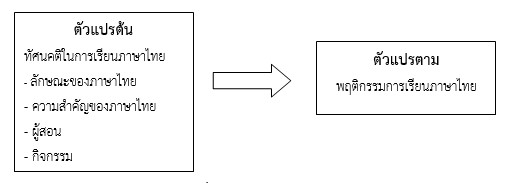Pariyapim Chalongdet Attitudinal Factors Influencing Thai Language Learning Behavior Among Undergraduate Students at Princess of Naradhiwas University
Main Article Content
Abstract
This research aims to examine the attitudes of undergraduate students toward learning the Thai language, assess the levels of Thai language learning behavior among undergraduate students, and investigate the attitudes that influence the Thai language learning behavior of students at Princess of Naradhiwas University. The quantitative sample group consisted of 237 students registered for the Thai language course. Additionally, a qualitative sample of 237 students registered for the same course was included. The research instruments employed in this study were a research questionnaire with a Cronbach's alpha coefficient of 0.937, and an interview form. Data analysis includes measures such as mean (), standard deviation (S.D.), and Pearson correlation coefficient.
The research findings indicate that attitudes of students toward studying Thai are overall at a high level (=4.08, S.D.= 0.621). Qualitative research has revealed that the simplicity of the Thai language contributes to easy reading and comprehension. Additionally, Thai is considered important due to its frequent usage. Teachers are well-prepared for instruction, and planned Thai language sessions facilitate better comprehension among students. Students' Thai language learning habits are overall at a high level (=4.12, S.D.= 0.712). Qualitative research has uncovered that students engage in both independent and classroom-based study. Students' behavior in learning Thai is positively influenced by both individual and collective attitudes, reaching statistical significance at the 0.05 level. Qualitative research suggests that maintaining a positive outlook on studying Thai encourages perseverance in the subject.
Article Details

This work is licensed under a Creative Commons Attribution-NonCommercial-NoDerivatives 4.0 International License.
References
กุลิสรา จิตรชญาวณิช. (2562). การจัดการเรียนรู้. สำนักพิมพ์จุฬาลงกรณ์มหาวิทยาลัย.
คณะศิลปศาสตร์ มหาวิทยาลัยนราธิวาสราชนครินทร์. (2566). พันธกิจ. https://libarts.pnu.ac.th/about-us/
ชูชัย สมิทธิไกร. (2561). พฤติกรรมผู้บริโภค. สำนักพิมพ์จุฬาลงกรณ์มหาวิทยาลัย.
ชูผิง เป้ย. (2558). ทัศนะของนักศึกษาต่อการเรียนการสอนวิชาภาษาจีน วิทยาลัยการแพทย์ ทางเลือกมหาวิทยาลัยราชภัฏจันทรเกษม. วารสารวิจัยทางการศึกษา คณะศึกษาศาสตร์ มหาวิทยาลัยศรีนคริทรวิโรฒ, 9(1), 44-55. https://ejournals.swu.ac.th/index.php/jre/article/view/6570/ 6193
นุชจรีย์ หงษ์เหลี่ยม, นัดดา วงษ์วรรณา และพิราวรรณ หนูเสน. (2560). การศึกษาพฤติกรรมการเรียนของนักศึกษาแพทย์ชั้นปรีคลินิกปีการศึกษา 2559 คณะแพทยศาสตร์ ศิริราชพยาบาล. เวชบันทึกศิริราช, 10(3), 166-173. https://he02.tci-thaijo.org/index.php/simedbull/article/view/ 1 06234/84142
บุญชม ศรีสะอาด. (2560). การวิจัยเบื้องต้น (พิมพ์ครั้งที่ 10). สุวีริยาสาส์น.
พิมลพรรณ เพชรสมบัติ และอธิพงษ์ เพชรสุทธิ์. (2564). พฤติกรรมการเรียนของนักศึกษามหาวิทยาลัยเทคโนโลยีราชมงคลธัญบุรี. วารสารวิจยวิชาการ, 4(4), 235-244. https://so06.tci-thaijo.org/ index.php/jra/article/view/247069/169613
วัสสิกา รุมาคม. (2561). กลวิธีการเรียนภาษาไทยและทัศนคติที่มีต่อภาษาไทยของนักศึกษา ระดับปริญญาตรีชาวไทยมุสลิมในจังหวัดปทุมธานี. วารสารวิจัยรามคำแหง (มนุษยศาสตร์และสังคมศาสตร์), 21(2), 36-49. http://www.journal.ru.ac.th/media/static/pdf/fulltext/None/2019-03-28_ZZkK OxZ.pdf
สมชาย วรกิจเกษมสกุล. (2554). ระเบียบวิธีการวิจัยทางพฤติกรรมศาสตร์และสังคมศาสตร์. อักษรศิลป์ การพิมพ์.
สุพัตรา สมนึก. (2550). กลวิธีการเรียนและทัศนคติที่มีต่อภาษาไทยของนักเรียนมุสลิม ระดับมัธยมศึกษาตอนต้น อำเภอเมือง จังหวัดยะลา [วิทยานิพนธ์ปริญญามหาบัณฑิต]. มหาวิทยาลัยธรรมศาสตร์.
โสภณ สาทรสัมฤทธิ์ผล. (2554). ภาษาไทย 1 (พิมพ์ครั้งที่ 3). ทริปเปิ้ล เอ็ดดูเคชั่น.
Cronbach, L. J. (1990). Essentials of Psychological Test (5th ed.). Harper Collins.
Triandis, H. C. (2001). Attitude and attitude change. McGraw-Hill.
Weinstein, C. E. & Mayer, D.G. (1986). The teaching of learning strategies. In M.C.Wittrock (Ed.). Handbook of research on teaching (3rd ed.). Mcmilliam.
Yamane, T. (1973). Statistics : An Introductory Analysis (3rd ed.). Harper & Row.


